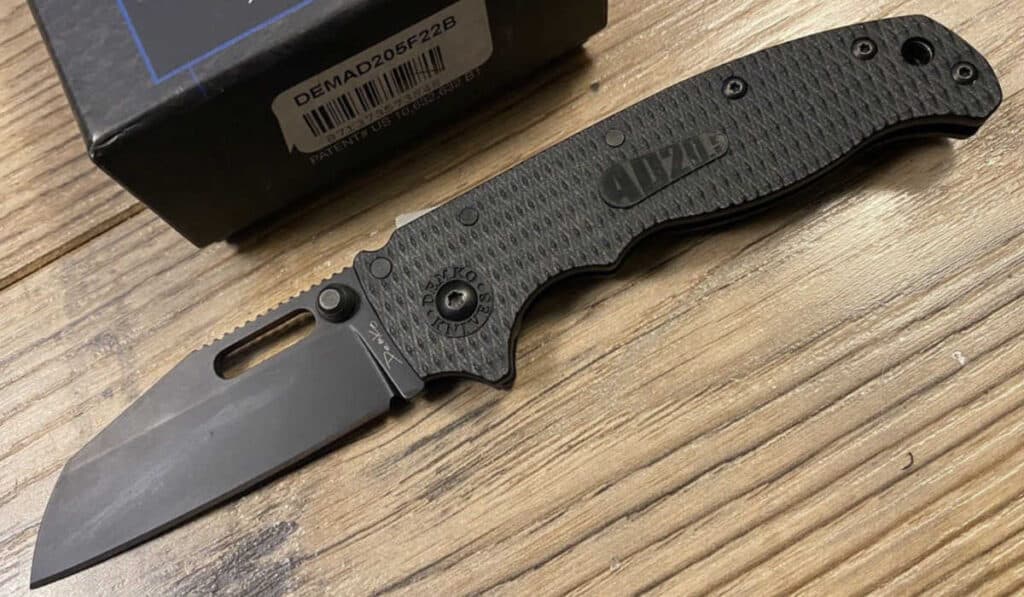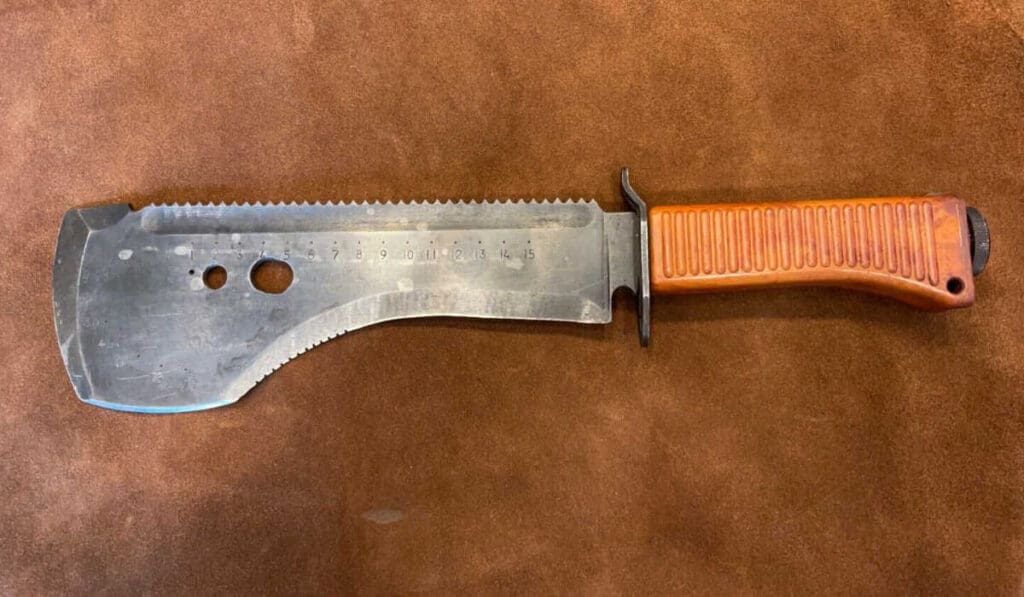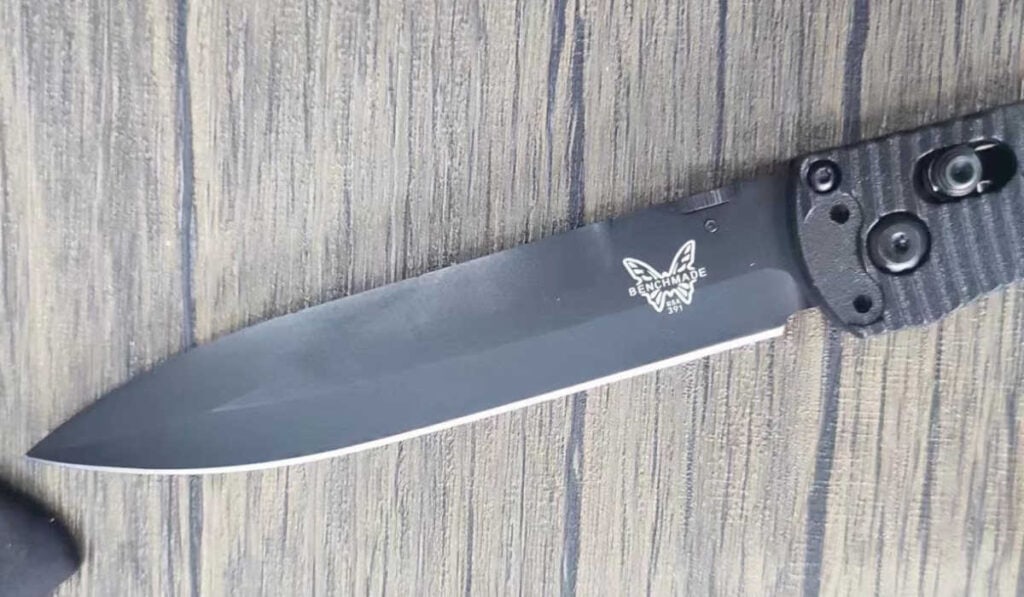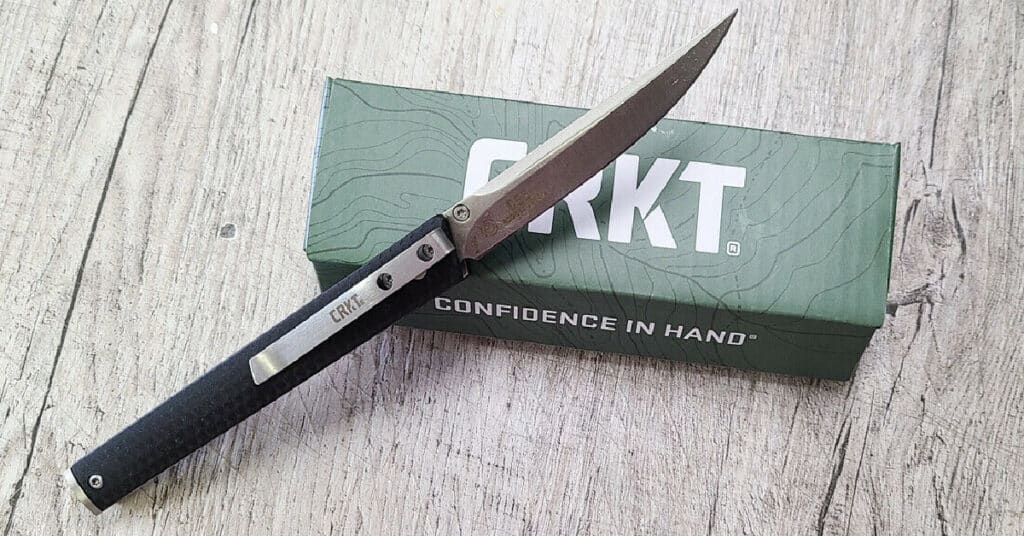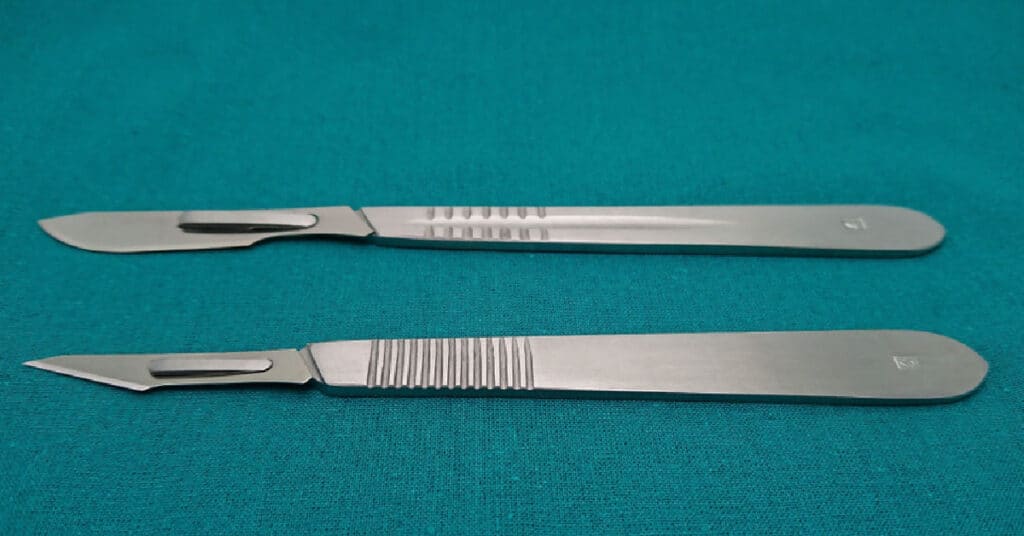Last updated on July 15th, 2023 at 07:24 pm
As an Amazon Associate I earn from qualifying purchases.
At A Glance
In the United States, you can generally carry a knife in your car, but regulations vary by state, blade length, and knife type. Blade lengths can range from 2.5 to 12 inches depending on the state, and certain knife types like switchblades are typically prohibited. Laws can change when crossing state lines. Penalties for violations can include fines or jail time. Knives should be securely stored in the car, preferably in the trunk or a sheath, and kept away from restricted areas. While the Second Amendment covers the right to bear arms, including knives, local laws must still be observed.
Carrying a knife in your car can be a confusing legal issue, as laws regarding this matter vary from state to state. It’s crucial to be aware of your local and state laws to avoid any legal trouble while having a knife in your vehicle. Understanding the type of knife, its intended purpose, and the applicable limitations on size can help you stay on the right side of the law.
In general, you can legally carry a knife in your car as long as it falls within the length limits set by the state, which can range from 2.5 to 12 inches for fixed-blade knives, with some states having no limit at all. Multi-tool devices, Swiss Army knives, and utility knives are typically allowed almost everywhere when the blades are shorter than 2.5 inches. However, there may be certain places where carrying a knife is prohibited, regardless of its size or type.
It’s important to note that traveling across state lines can expose you to different knife laws, so always ensure you are familiar with the regulations of your destination. Being knowledgeable about specific knife laws and restrictions will not only keep you in compliance with the law but also help you make informed decisions regarding the type and size of the knife you carry within your vehicle.
State Laws and Regulations
State laws and regulations regarding carrying a knife in your car vary widely across the United States. Different states have different definitions of what is considered a legal knife, and some have more restrictive laws than others.
In Florida, pocket knives, balisong knives, and switchblades are legal to own and carry, but gravity knives are prohibited. California, on the other hand, has more specific regulations, dividing their knife laws into three categories. These categories include: knives that can be worn openly but not concealed, knives that can be carried both openly and concealed, and knives that are always illegal to carry.
Ohio has additional age restrictions: individuals under the age of 18 are not allowed to possess a knife with a blade longer than 3.5 inches, while those under the age of 21 are prohibited from carrying automatic opening knives such as switchblades or gravity knives.
In contrast, states like Texas and Alabama have relatively lenient knife laws, allowing most types of knives to be carried openly or in a vehicle, although there are still restrictions on certain dangerous types like ballistic knives. However, local municipalities in these states may have their own regulations that are more restrictive than state laws.
It is important to note that knife laws can change, and it’s essential to stay up-to-date with the latest legislation in your state or any states you plan on traveling through. Additionally, some states may have specific laws regarding the transport of knives in vehicles, so it’s crucial to familiarize yourself with those regulations as well.
➤ Read More: State Knife Law Directory
Types of Knives and Restrictions
When considering whether or not you can carry a knife in your car, it’s important to understand the various types of knives and the restrictions that may apply. Several different types of knives are commonly found or used, including dagger, stiletto, bowie knife, utility knives, automatic knife, ballistic knife, switchblades, folding knives, dirks, daggers, Swiss Army knives, multi-tools, gravity knives, pocketknives, and even cooking knives.
Each state has its own specific laws and regulations regarding what types of knives are allowed and under what circumstances they can be carried. For example, in many states, folding knives, such as a Swiss Army knife, are legal to carry as long as they meet certain length requirements. On the other hand, switchblades and automatic knives are generally illegal to carry across state lines due to the Switchblade Knife Act of 1958.
It’s essential to research your local and state laws before carrying a knife in your car, as the types of knives allowed and their restrictions can differ significantly depending on your location. Additionally, it’s worth noting that restrictions may differ for fixed blade knives and folding knives, which could impact your decision on what kind of knife to carry.
Always keep in mind that carrying a knife in your car may be subject to several restrictions and regulations, and it’s your responsibility to be knowledgeable about your state’s specific laws regarding knife possession and transport.
Carrying a Knife in a Car
Carrying a knife in your car is generally legal, but there are certain rules and limitations that you must be aware of. The laws regarding carrying knives in a car vary from state to state within the United States, so it’s essential to be informed about the specific regulations in your area.
One important factor to consider is whether you plan to carry the knife openly or concealed. Many states allow for open carry of specific types of knives, while others may place restrictions on carrying them concealed in a vehicle. For example, Alaska allows open carry for all types of knives without blade length restrictions for individuals aged 21 and above.
The type of knife is another crucial aspect to take into account. While common everyday carry knives, such as pocket knives, are generally accepted, some states may impose restrictions on carrying certain types of knives, like switchblades, gravity knives, and butterfly knives. Make sure to check your state’s regulations on specific knife types.
Blade length is another aspect that you need to consider when carrying a knife in your car. Some states enforce length limits on the knives that can be legally carried, ranging from 2.5″ up to 12″ for fixed-blade knives. Others may have no length limit, so it’s important to know the rules in your region to avoid any legal issues while traveling.
While it’s entirely possible to carry a knife in your car legally, be cautious and ensure that you’re well-versed in your state’s knife laws. This knowledge will help you confidently comply with the regulations and avoid any unnecessary conflicts or misunderstandings with law enforcement officers.
Penalties and Fines
Carrying a knife in your car can lead to various penalties and fines, depending on the jurisdiction and local laws. It is essential to understand that the type of knife, its length, and the purpose of carrying it can all influence the legal consequences one may face.
Fines for carrying an illegal knife can vary significantly between states and even within city or county limits. In some cases, fines can reach up to $1,000 or more, depending on the specific knife type and violation. In general, it is essential to research local laws and regulations, as some areas may have stricter knife policies than others.
Aside from fines, other potential penalties include jail time or even a felony charge. As mentioned earlier, this depends on the type of knife involved, the local jurisdiction, and the nature of the violation. A felony charge can have a lasting impact on someone’s life and future opportunities, so it’s essential to be aware of the possible consequences before carrying a knife in your car.
In some scenarios, if the knife is considered a weapon, moving with one could be considered a serious crime. This can lead to more severe penalties such as jail time or heavy fines or both. It is crucial to be cautious and knowledgeable about the knife laws in your area.
Proper storage and transportation of knives can also play a significant role in whether carrying a knife in your car is legal or not. In general, as long as the knife carried is not a prohibited type of knife and follows state and local laws, it is generally considered legal. However, always make sure to check with local authorities and stay informed about the applicable laws in your area.
In conclusion, penalties and fines for carrying a knife in your car can vary significantly based on the knife type, jurisdiction, and circumstances surrounding the violation. It is crucial to research and understand the local knife laws to avoid any legal consequences.
Specific Locations and Restrictions
When it comes to carrying a knife in your car, it is essential to be aware of specific locations and restrictions that may apply. Although it is generally legal to have a knife in your car, the type of knife and the locations you are traveling to or through can impact the legality of your actions.
Different states within the United States have varying knife laws, so it’s crucial to familiarize yourself with local regulations, especially when traveling between states. State laws can dictate the type of knife allowed, such as a pocket knife, hunting knife, or other non-prohibited knives.
Some locations apply stricter regulations on carrying knives. For instance, schools are among the areas where it’s illegal to carry a knife, regardless of the type. Furthermore, knives are not allowed on planes, in courts, or government buildings. When it comes to federal buildings and property, carrying a knife, even if it’s a pocket knife, can lead to serious consequences.
Military bases also enforce strict regulations on knife-carrying, with exceptions made only for military personnel. If you plan to visit a military base, check their specific rules beforehand to avoid any legal complications.
Another aspect to consider is whether you have a concealed carry permit or a concealed weapon permit. These permits typically apply to firearms, but some states may include knives in their regulations. It’s important to check local laws and guidelines to ensure that your knife-carrying activities align with legal requirements.
In summary, carrying a knife in your car can be legal, depending on the specific knife and the location. It is essential to research the applicable laws and restrictions, particularly when traveling across different states, to ensure you are in compliance with local regulations.
Storage and Accessibility
Carrying a knife in your car is subject to state laws. It is essential to be aware of these regulations and ensure proper storage and accessibility to avoid any legal issues. You can legally carry a knife in your car as long as it is below the length limit set by the state, which can range from 2.5″ up to 12″ for fixed-blade knives or have no length limit at all, depending on the location.
While transporting a knife, it should be stored securely and out of reach. One method is to keep the knife in a sheath. This not only protects the blade from damage but also prevents accidental injuries. If you choose to store the knife in the car’s cabin, avoid placing it in locations that can be easily accessed while driving, such as the center console, door trim panel, or between the seats.
Another option is to store the knife in the trunk of your car. This further reduces the risk of the knife being classified as a deadly weapon, as it is difficult to reach while seated in the vehicle. Storing the knife in the trunk also helps ensure that it remains out of sight and reduces the chances of misinterpretation or potential theft.
Make sure to avoid carrying knives in restricted areas, such as schools, government buildings, courthouses, airports, and places of worship. It is crucial to be aware of local and state laws to avoid any complications related to carrying a knife in your car.
Carry Laws and the Constitution
Carry laws in the United States vary from state to state, with some states allowing more freedom in carrying knives than others. The constitution is a significant factor in the realm of carry laws, as the Second Amendment guarantees the right to keep and bear arms. It is important to note, however, that the right to bear arms is not limited to firearms and may also be applicable to knives and other forms of weaponry that can be used for self-defense.
The federal government mainly addresses knife laws through the Switchblade Knife Act of 1958 and its 2009 amendment. These federal laws apply in cases where individuals are traveling between states or internationally.
In many states, it is legal to carry a knife as a form of self-defense. However, specific knife types and their lengths may have restrictions. It is essential to understand a state’s particular knife laws before choosing to travel with a knife in your car or on your person.
While the concept of constitutional carry primarily applies to the carrying of handguns, it can also be extended to the carrying of knives in certain states. Constitutional carry is the practice of permitting the public carrying of a weapon without requiring a license or permit. This policy covers both openly carried and concealed weapons, depending on the state’s specific regulations.
States like Washington, California, Washington D.C., and New York have various regulations on knife carry, and failing to comply with these guidelines can lead to arrest and prosecution. As a responsible citizen, it is crucial to familiarize yourself with the carry laws in your state to ensure that you are exercising your constitutional rights within the bounds of the law.
Navigating the complexities of carry laws and the constitution can be challenging, but understanding the rights and responsibilities provided by both is essential for anyone interested in self-defense and weapon ownership. Always remember to verify the specific laws in your state and remain compliant with the regulations.
Legal Help and Advice
Carrying a knife in your car is subject to varying state laws, so it’s crucial to be aware of the regulations in your jurisdiction. If you have any concerns, doubt, or want to ensure you’re abiding by the law, consulting with an attorney familiar with your local or state’s knife regulations can provide useful guidance.
Attorneys can help you interpret the specific details of knife laws and the implications of carrying a knife in your car. For instance, they can clarify the legal limitations on fixed-blade knife lengths that may range from 2.5″ up to 12″ or inform you about automatic knife restrictions in certain cities like Baltimore.
Since state laws differ, it’s essential to consider that if you’re traveling, the legality of carrying a knife in your car may change as you cross state lines. Always verify the laws of any state you plan to visit or pass through, and seek the help of an attorney when necessary to make informed decisions and stay within legal limits.
In addition to state laws, it’s also essential to keep in mind the minimum federal regulations established by the Switchblade Knife Act. These regulations can impact your knife-carrying decisions, particularly when traveling between states or internationally.
In conclusion, seeking legal help and advice from an attorney experienced in knife laws can be invaluable for understanding local and state regulations and ensuring you are abiding by the law when carrying a knife in your car. Make sure to consider the specific characteristics of your knife, your planned travel destinations, and any regulations that may apply locally, statewide, or federally.
Transportation Restrictions
When it comes to carrying a knife in your car, there are several factors to consider, including ownership laws, length limits, and local ordinances. It’s essential to be aware of these restrictions to avoid potential legal issues.
In some states, you can legally carry a knife in your car as long as it is below the length limit set by the state. Length limits range from 2.5″ up to 12″ for fixed-blade knives, and some states have no length limit at all. Always check your local laws, as they can vary widely from region to region.
If you are driving across state lines, be aware that you may be subject to multiple sets of laws regarding knife carry, including ordinances of cities and towns you pass through on your trip. It is essential to familiarize yourself with these laws to ensure compliance.
For air travel, knives are not allowed in carry-on bags, except for plastic or round-bladed butter knives, according to the Transportation Security Administration (TSA). Knives are allowed in checked bags, but it is always best to double-check the specific airline’s policies before packing.
In some cases, there are exceptions to carrying a knife in your car for specific purposes, such as transporting the knife for repair, as long as the cutting edge is less than 4 inches in length. Be sure to research the laws in your specific area to determine any exceptions.
Additionally, some states have laws that forbid the aggravated display of a knife or committing a crime with a knife. These laws are usually enforced after the fact and can result in increased penalties for crimes committed using a knife.
In conclusion, understanding the transportation restrictions for carrying a knife in your car is crucial. Be sure to research your local and state laws, as well as the policies of any airports or transportation centers you may be traveling through. Stay informed and stay legal.
Do Sheepsfoot Blades Have A Purpose? (Cuz They’re Ugly…)
Spetsnaz Machetes – Blades Of The Russian Special Forces
What Is The Actual Purpose Of A Spear Point Knife Blade?
CRKT CEO Review – Coolest, Most Worthless Knife Ever?
How Sharp Is A Scalpel? (Is It Sharper Than A Razor?)
Can You Shave With A Knife? (Yes, Here’s How)
As an Amazon Associate I earn from qualifying purchases.


